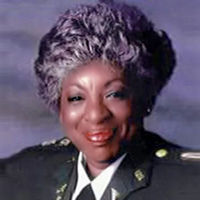

PATRICIA JACKSON-KELLEY
Patricia Jackson-Kelley is a veteran of the US Air Force, Army, Air Force and Navy Reserve. She retired with the rank of Lieutenant Colonel after 26 years of combined active duty and reserve services. Lt. Col. Jackson-Kelley served as the Program Mgr for a 40-bed substance abuse ward and as the Women Veteran Program Manager with the Dept of Veterans Affairs – W. Los Angeles. She was instrumental in implementing programs, funds and resources for women veterans. Currently, Lt. Col Jackson-Kelley serves as the National President of the National Association of Black Military Women.
![]()
![]()
Lt. Col. Jackson-Kelley has received awards and commendations from President George W. Bush, California Governor’s Offices 2006-2009, NAACP, Blacks in Government, and various other community organizations. In 2010 she was selected as Southern California Women Veteran of the Year by the California Department of Veterans Affairs. She also received commendation from past V A secretary, Robert McDonald for her service on the National Center for Minority Veterans committee from 2015-2017. In 2017 Lt. Col Kelley-Jackson was awarded the Lifetime Legacy Award by Connected Women of Influence, and in 2018 she received the Crystal Eagle Award by Los Angeles County African American Employees Association. Also in 2018, Lt. Col Jackson-Kelley was honored as the Holeman Community Development Corporation Quiet Champion Award, she received the City of Los Angeles Hall of Fame Award, and was named UCLA Veteran of the Year. In 2019 she was the Hollywood Business and Professional Women Black History Month Honoree. In addition, she received several very prestigious awards from The Daughters of the American Revolution and the African Focus Goodwill Lifetime Achievement Award.
PRESENTATION TOPICS
- Honor Her Service & Empower Her Future: The Mission of Foundation for Women Warriors
- The Unique Experience of Women Veterans: Lessons for Diversity & Inclusion
- Social Cognitive Theory and Veterans: Why Messaging Matters
- Women’s Military History: Feminism Looks Like This
- Women, Warfare, and Representation by Author, Dr. Emerald Archer
BIO
Lieutenant Colonel Patricia Jackson-Kelley was born in the very small town of Bayboro, North Carolina—part of a family with a tradition of service to their country, and to their community.
Her mother’s example inspired Patricia to be a nurse, after which she took that calling and followed in her father’s and brothers’ footsteps, volunteering to serve the nation in uniform as a nurse, for 26 years.
Even as Patricia was serving in the Army Reserves in California, she stepped up to serve Vets at the West Los Angeles VA Hospital. There, over the course of 14 years as a VA nurse, her second career, Patricia was fighting for Vets who needed her compassion and nursing excellence the most—Vets struggling with mental health challenges, with substance abuse challenges, and with homelessness.
For 10 of those years as the Women Veteran Program Manager, Patricia was advocating for women Vets. And, for her, that advocacy meant, in part, going to the very front lines of homelessness in LA, skid row, often alone, to find and connect with women Veterans who had fallen into homelessness and help them get the support they needed not just to survive, but to thrive. Because of her expertise, Patricia was asked to help shape effective programs for ending Veteran homelessness.
In the years since retiring from the Army and Veterans Affairs, Patricia continues serving her community, this country, and fighting for Veterans in an abundance of ways—as the County of Los Angeles Commissioner for Military and Veteran Affairs in the 2nd District, as President of the National Association of Black Military Women, on the Board of the Foundation for Women Warriors, and with the non-profit Women Veterans on Point, among so much more.
Patricia’s incredible life is a reminder for all of us that so many Women Vets like her don’t just serve while in uniform. They serve for a lifetime. Over the years, Patricia has served her country. She’s served her fellow Vets. She’s served us all. And we are, all of us, so much better for it.




